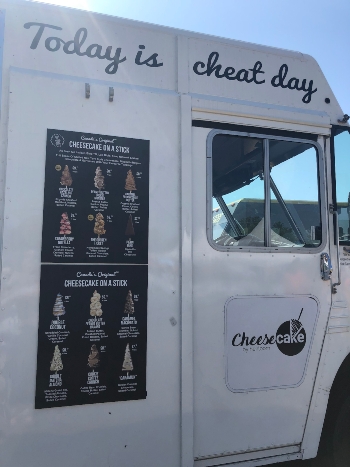
Hit the road! Food trucks gain popularity
September 13, 2019
By Bakers Journal
 Cheesecakes go portable via food truck promotion Photo courtesy of Naomi Szeben
Cheesecakes go portable via food truck promotion Photo courtesy of Naomi SzebenClimbing real estate prices and ever-climbing rental rates are contributing to fewer restaurants and bakeries aiming for a bricks-and-mortar location; Many start-ups and even some established bakeries are opting for the mobility that food trucks offer as a cost-effective promotional tool.
More cities are cashing in on food truck festivals, to see what local chefs and creative food industry professionals can cook up. From gourmet mac ‘n’ cheese, to wood fired pizza, fast food is taking on the slow food movement and making homey dishes for those on the road.
Food trucks have advantages such as lower monthly fees, and with a smaller space to work in, less staff means less payroll to worry about. Mobile food catering can be a great way to get your business on the road. Food truck businesses can start anywhere from $5000 to $100,000.
Trucks without a kitchen start at the lower end of the spectrum, between $5000 to $14,000. The size of the truck may mean that what is saved on rent or staff may be needed in licenses and the price of inspections, generators, gas and/or propane.
Prices for food truck kitchens depend on size as well; On average the largest size for a kitchen is roughly 18 feet; the smallest is 12’. Prices range between $12,000 to $31, 700 though depending on your truck dealer, costs may differ. First-time entrepreneurs may consider renting a truck as a trial run, to see what the clientele and overall yield may range.
The hundred year old bakery and former Jake the Baker Award winner, Eric Forbes of the Kimberly City Bakery is also jumping on the food truck bandwagon.
“Most people go from working a food truck and going to a brick and mortar; we’re doing the opposite. We’re going from a brick and mortar and going on to a food truck and baking a hundred per cent from scratch on a food truck.”
This presents a first for wood fired bakery on wheels: “I’m going to install a wood fired oven on to the truck, and taking our recipes which have been wood-fired recipes and baking from a truck.” Forbes mentions he estimates the wood-fired bakery foodtruck will be up and running in May of 2020. Currently, KCB Streetfood is operating in B.C.
Bringing traditional recipes to the streets is a natural progression for many rural bakeries that are outside city limits. Where bakeries used to make deliveries, food delivery services like DoorDash bring delicacies to customers. Food trucks brings the food closer to potential clients, and offer “keyboard convenience” with features like calling ahead to place an order for pickup.
To find out if the food truck angle for your bakery or restaurant is for you consider the following tips:
Market research
Know your market, and find out who your competition is. First, determine who your target sales would be: If you plan on parking your truck (permit allowing it, of course) in an upscale office neighbourhood, your prices and wares should reflect the clientele. What you want to sell can be influenced by what is not found in the area. Wood fired pizza or fresh crêpes can stand out in a field of doughnut and sandwich shops.
Know your demographic. If you are near a university, a more affordable, but healthy option could go over better than expensive items. Consider if you would want to sell pre-packaged or bagged lunches.
Once you know what districts allow food trucks, and if you have your ideal location(s), try getting a sense of what the locals want. Have a chat with the local chamber of commerce, meet with the Business Improvement Association for that district, talk to individuals who are taking their lunch in the area.
Your next step would be to start up a business plan. It’s a vital step towards getting the attention of investors, clients and banks or licensing offices.
Locations
Aside from licensing (see below) you’ll want to think of events, and festivals. Opportunities like tourist attractions attract foot traffic, and make sure that you link your food truck’s social media accounts to local calendars.
In Toronto, food truck operations are limited to:
- Public roads with a mobile vending permit
- “Green P” parking lots with a permit
- No more than two food trucks allowed per city block
- Maximum operation time of five hours at any one time
- 30 linear metres from an open and operating restaurant (not including food courts or entrances to malls or office buildings that include food courts.)
Licenses
Depending on your province, there may be restrictions as to where you can park your vehicle, if at all. Many provinces limit food trucks to parking lots or undeveloped areas.
To date, there are three licence types for Refreshment Vehicles: Motorized vehicle owner, refreshment vehicle driver and refreshment vehicle Assistant. You will also require a propane license.
Current by-laws state that all employees who either drive the truck or service customers need to have either a Refreshment Vehicle Driver’s License of a Refreshment Vehicle Assistant’s License.
Prepare yourself for Public Health Inspections and Food Handler Certifications as well; Public Health officials in your province can help you navigate the needed certifications.
Get Insurance:
Research which business-specific insurance coverage is available for your mobile food truck.
Social Media, Festivals and Events
Promote your food truck on social media apps like Instagram, Facebook and Twitter. You’ll find yourself looped in on food-related events, and food truck festivals. This is a great way to get locals to learn about your bricks-and-mortar location and or offer your services to cater events. (Weddings offering food truck options are gaining in popularity.)
Subscribe to a range of online neighbourhood calendars to keep abreast of holiday events and bring your food truck to shopping mall openings, concerts or other events. Otherwise, offices and colleges are great regular locations during weekdays.
Eva’s Chimney Cakes in Toronto attended the Food Truck Festival, and drummed up more interest in their Bloor Street location as well as informing potential customers of their catering services. Britney York operated the Eva’s Chimney Cakes food truck for Food Truck Festival and was delighted by the response. “It’s so great,” said York, of the festival. “It brings so many people down to Toronto, and a lot of people from out of town get to experience a range of different foods that can be made or served from a truck.”
In short, the future of small start-up bakeries might mean taking the bakery on the road. Mobility may win out over the cost of rent and operating costs in the long run, so…hit the road, Jack!
Print this page

Leave a Reply